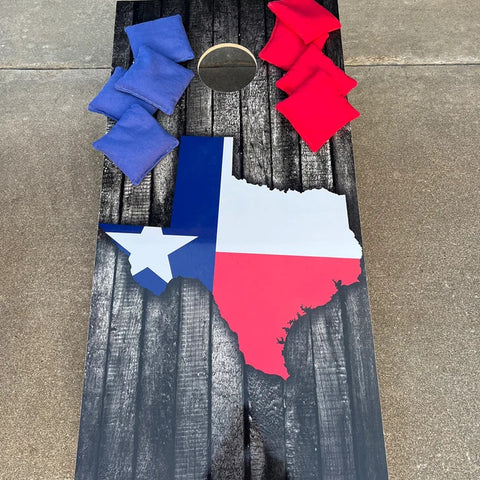Cornhole, also popularly known as beanbag toss, has come a long way from being simply a family pastime game to becoming a professional sport. For those who have never played cornhole before, it's a fun and challenging game that's enjoyed by people of all ages.
Cornhole involves tossing beanbags into a small hole on a raised platform, and it's all about precision, technique, and strategy. With the rise of cornhole enthusiasts, the game has evolved over the years to become a competitive sport enjoyed by many and recognized nationally. In this blog post, we'll explore the evolution of cornhole from its humble origins to becoming a professional sport.
Origin and History of Cornhole
The origins of cornhole are disputed, but it is said to have started in the Midwest, particularly in Ohio, back in the 1800s. The game was initially played using corn-filled sacks, which explains the name cornhole. However, as time passed, beanbags replaced the corn-filled sacks, making the game more comfortable to play. Cornhole started as a backyard family game played by friends and family members during social gatherings such as tailgating parties, picnics, and outdoor events.
The Rise to Prominence
While the game originated in the Midwest, the charm of Cornhole soon spread across the United States. It wasn't long before it made its way into the tailgate parties of sports enthusiasts, the backyard barbecues of the South, and the beach parties on the coasts. This proliferated mainly due to the simplicity of the game which requires just a board and some corn bags and the fact anyone could play it, regardless of age or athletic ability. As the popularity of the game grew, so did the desire for a more competitive platform.
In the early 2000s, governing bodies like the American Cornhole Association (ACA) were formed to standardize the rules and to hold official tournaments. These organizations played a significant role in shaping Cornhole into a professional sport. The impact was such that by 2005, ESPN began broadcasting the tournaments, giving the sport a national platform and thus, elevating it from a simple backyard game to a serious professional sport. Today, Cornhole competitions are held nationwide, with thousands of players competing in various leagues and tournaments, truly marking the evolution of a humble pastime into a respected sport.
Cornhole Company and American Cornhole Association
The official recognition of cornhole as a sport started in the mid-2000s when a company known as the American Cornhole Company was established. The company started organizing cornhole tournaments that attracted many enthusiasts. In 2005, the first-ever American Cornhole World Championships were held in Ohio, and the American Cornhole Association (ACA) was founded a year later. The ACA is responsible for organizing tournaments and events nationwide and establishing rules and regulations governing the sport. Today, thousands of players compete in ACA competitions across the country for prize money.
The American Cornhole Association: A Closer Look
The American Cornhole Association (ACA) is the official governing body of professional cornhole, responsible for establishing and regulating the rules of the game, ensuring fair play, and promoting the sport nationwide. It operates with the primary goal of making cornhole a standard, accessible, and celebrated sport for all.
The ACA conducts an array of tournaments and events throughout the year, catering to all skill levels. These range from local community tournaments to the prestigious annual American Cornhole World Championships, attracting cornhole professionals from around the country. It also offers a ranking system for players, providing an opportunity for enthusiasts to track their progress and strive for improvement.
Beyond competition, the ACA is also deeply involved in the development of the sport. It certifies equipment, ensuring that all regulation cornhole boards and bags used in official tournaments meet their standards for size, weight, and materials. They are also sticklers for proper cornhole distance. The ACA is also committed to community engagement. They provide resources such as how-to guides, tips, and strategies on their website to help fans and players better understand and enjoy the game.
In essence, the ACA is more than just a governing body. It's a community of cornhole enthusiasts committed to promoting and preserving the integrity of this beloved American pastime, continually working to elevate it to new heights.
Cornhole in the Olympics
Cornhole made its way into mainstream culture, and in 2018, it was announced that cornhole might be included in the Olympics. This announcement came after the World Corporate Games featured Cornhole as one of their sports. While nothing is set in stone, the notion of cornhole becoming an Olympic sport could soon become a reality.
Cornhole Potential Olympic Debut
The journey of cornhole from backyard family game to an Olympic sport is nothing short of remarkable. Even though it has not been officially included in the Olympics yet, the idea is gaining traction. The consideration of cornhole as an Olympic sport was first brought up in 2018 when the World Corporate Games recognized it as a viable competitive sport.
The potential inclusion of cornhole in the Olympics is a testament to its growing popularity and acceptance as a professional sport. Its simple rules, inclusivity, and strategic nature make it a perfect candidate for an Olympic event. It would not only bring more visibility to the sport but also give cornhole players a global platform to showcase their talents.
Though there are hurdles to overcome before cornhole can make its Olympic debut, advocates for the sport are optimistic. The American Cornhole Association, among others, is actively advocating for its inclusion, highlighting the sport's wide appeal and low barriers to entry as attractive factors.
Cornhole Global Popularity

Cornholes popularity has transcended beyond the borders of the United States, finding favor in various countries worldwide. In Europe, particularly in countries like Germany and the UK, cornhole has gained recognition as a fun, accessible, and strategic game suitable for all ages. Numerous local tournaments and events are being organized, fostering a growing community of cornhole enthusiasts.
In Australia and New Zealand, the game has been embraced for its simplicity and the camaraderie it fosters, becoming a common feature at social gatherings and outdoor events. Asian countries like Japan and South Korea have also begun acknowledging cornhole as a recreational activity, with pockets of players and clubs sprouting across major cities.
The global acceptance of cornhole can be attributed to its easy-to-understand rules, minimal equipment requirements, and its ability to bridge cultural and language barriers. As cornhole continues to gain international attention, it's likely that we will see the establishment of more formal associations and possibly international tournaments in the future, further cementing cornholes place as a beloved game across the globe.
While we wait for the official announcement, the prospect of seeing cornhole in the Olympics adds another layer of excitement for fans and players alike. It's a nod to the sport's evolution and a chance for it to be recognized on the world stage. Whether or not cornhole makes it to the Olympics, the sport's journey so far is a testament to its enduring appeal.
Watching Cornhole on TV and Online
Cornhole has become a televised sport that is aired on ESPN and many other channels, and there are online streams of cornhole tournaments that are viewed by millions of fans globally. Some well-known cornhole players have become household names, and some commentators call them the "LeBron James" of cornhole. Top competitors have become media celebrities and are recognized in the same way as other sports stars.
How and Where to Watch Cornhole
Cornhole enthusiasts can access a vast array of live matches and tournaments through several TV and online platforms. ESPN has been a significant player in broadcasting cornhole, showcasing top-tier matches and events. On ESPN, viewers can enjoy high-stakes games, including the finals of the American Cornhole League's Championships.
For viewers who prefer online streaming, platforms like YouTube and Facebook are excellent resources. The American Cornhole League (ACL) maintains an active YouTube channel, where they regularly post live streams of their tournaments, highlights from games, and instructional videos. These platforms provide a more interactive experience, allowing fans to engage in real-time through comments and reactions.
In addition to ESPN and YouTube, the Cornhole World Championship is streamed on the official ACA website, making it a must-visit site for any cornhole fan. By offering a mix of live and replay options, these platforms ensure that fans never miss a key match, regardless of their time zone or schedule.
Lastly, for those who prefer a more immersive and customized viewing experience, subscription-based streaming services like WatchESPN and ESPN+ offer live and on-demand access to cornhole matches. These services provide higher video quality and fewer ad interruptions, making for a more comfortable and enjoyable viewing experience.
Overall, there are numerous ways to watch cornhole, whether on TV or online, live or on-demand, allowing fans worldwide to enjoy this exciting sport at their convenience.
Cornhole is Here to Stay...and Grow
Cornhole has grown tremendously over the years and has become a professional sport enjoyed by millions of people worldwide. It's a sport that has united people and communities and provided a healthy outlet for people of all ages. The evolution from being a backyard game to a competitive sport is nothing short of remarkable, and with the increasing recognition and popularity of cornhole, it will continue to inspire people to join in on the fun, challenge themselves, and maybe even make cornhole a profession. The future of cornhole looks bright, and we can't wait to see what's next for this beloved sport!


